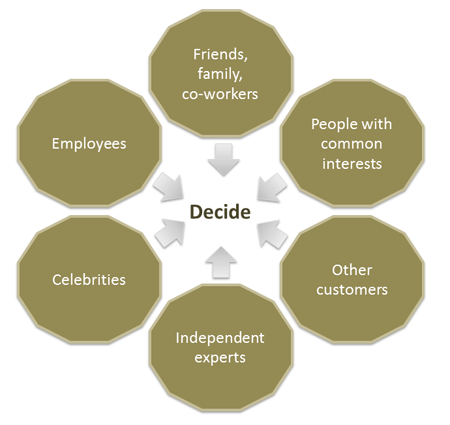All of this social interaction on the web today really supports consumers in each of their purchase or engagement decisions. We talk about social commerce as if it were something new. There has always been a social element to commerce – in every sphere we rely on others to help inform our purchase decisions. What is new is the efficiency with which this social influence process can now happen thanks to blogs, forums and social networks such as Twitter and Facebook.
I see six (not four) pillars to the social influence dynamic that are worth being conscious of as you plan your social strategy:
Friends, family members and co-workers typically have the most immediate impact on our purchase decisions on a daily basis. Consumers are connected to many of their personal networks online and the new movement in social commerce sees brands enabling individuals tap into the experiences and recommendations of friends in order to drive sales.
We also tend to rely on the recommendations of people with whom we share an interest (in social media, sport, music etc). Thanks again to social tools we can now easily connect with people that we have never met but with whom we enjoy interacting, because they are passionate about the same things that we are.
Since the web offers unprecedented choice, consumers regularly find themselves presented with choices that no one in their personal or social networks has the previous experience to help them with. The anonymous ratings and reviews left by other customers are increasingly valuable in this world of seemingly endless options.
Friends, people with shared interests and other customers may not always have the deep knowledge of a product or service that is adequate to help us make up our mind. Consumers tend to trust the views of independent experts especially on complex purchases or where a high degree of commitment is involved.
Let’s not forget about the impact of celebrities on consumer decision-making. Celebrities, in all walks of life, represent aspirations that have been fulfilled. We naturally like to identify with people who represent success in whatever spheres are important to us. Celebrities have never been so accessible and indeed many now see social media engagement as central in supporting their fan bases.
Finally, since individual employees of organisations often hold greater sway amongst consumers than the corporate advertising or communications activities of brands, they are a greatly untapped resource. Google recently demonstrated that this realisation when it announced that it has given a social media mandate to every single employee.
Influence is complex. Each purchase or engagement decision will rely on a different mix of social and other influencing factors. One thing is certain; as the fabric of society changes thanks to ever-evolving communications capabilities, sales and marketing people would be foolhardy to ignore the dynamics of social influence.
